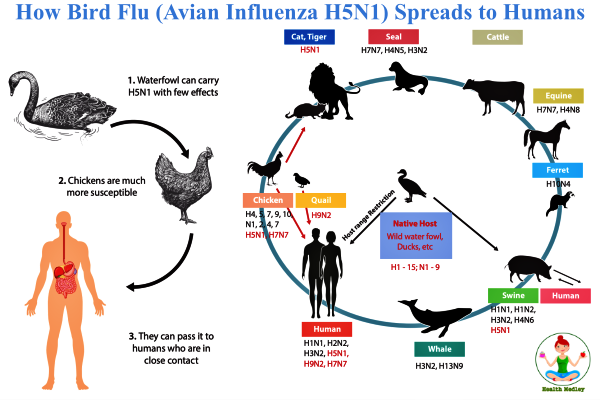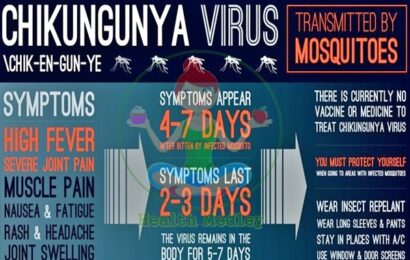Avian Flu, more commonly known as Bird Flu, is a common type of viral infection which can affect humans and other animals. However, you can find that most forms of this virus are found to infect the birds more than other living beings. One of the most common forms of Bird Flu is the H5N1. This form of flu is very deadly to most birds and can spread to humans and animals that come in contact with any person carrying the virus. Most scientists believe that this virus doesn’t spread on human-to-human contact but they predict that there is a risk that it could become a pandemic threat to all living forms in the future.
What is Avian Flu (Bird Flu)?
So first things first! What is avian influenza? The bird flu virus is usually caused by strains of influenza virus. This virus affects most birds primarily. Back in the day, this virus wasn’t considered deadly but in the late 1990s, a newer highly pathogenic avian influenza was spreading across the world, especially among chickens and ducks, and was termed as H5N1.
What are the causes of Avian Flu?
The Avian Flu is usually caused by a different type of Influenza virus. The influenza virus has three forms – A, B & C. The Influenza A Virus is the primary cause for the spread of Avian Flu. Although usually, the host-virus naturally remains in a specific kind of animals but sometimes it transfers over to human beings when in contact with the virus carrier. The various bird flu causes are listed below:
- Village Poultry Farms: During the early days of the discovery of this virus, most farmers and people who had own poultry farms seemed to be down with the virus. They would have come in contact with animals carrying the H5N1 virus.
Coming in Contact with Sick Animals
Usually, the most common cause of the spread of the disease to the humans is being in contact with Sick Poultry animals. Avoid animals which are showing signs of sickness and isolate them from other animals to make sure the infection doesn’t spread to others as well.
Consumption of Virus infected Poultry Food
Try to avoid food from poultry farms where there has been a previous virus break. The eggs and other dairy products you consume might be infected with the virus and can spread to your body.
What are Risk Factors associated with Bird Flu?
Most people usually show signs and symptoms of bird flu after being in contact with infected birds including Chickens. The risk factors where you can be infected with bird flu include:
- Caring for sick Birds
- Preparing and consuming Sick birds
- Killing sick birds off.
It is very difficult for bird flu virus to infect the human body cells but due to mutation involving antigenic shifts can cause the virus to be transmitted to a human body. Making a direct contact with poultry animals that are sick constitutes the major factor for the spread of the disease but contact with materials like unwashed eggs and water contaminated by animals also provide a huge risk.
What are the Symptoms of Avian Influenza?
After the exposure to bird flu virus, an infected person usually shows the Avian Flu symptoms in 2 to 8 days. Some of the most common bird flu symptoms in humans include:
- Fever (Above 101 F)
- Sore throat
- Cough (Most times, dry and no production of sputum)
- Muscle pain
- Joint Paint and lethargy
- Eye infections
- Insomnia
The avian influenza symptoms are usually similar in children as well as the adult. If not identified in time, this infection can even lead to an aggressive form of pneumonia, called ARDS, and further lead to respiratory failure. It is highly advisable to contact your doctor as soon as you see bird flu symptoms.
What are the Things to keep in mind for Preventing Avian Flu?
At present, scientists have not been able to find any commercially available vaccination for Bird Flu in human. However, as long as you take necessary precautions for bird flu prevention, you would be safe from being infected by the virus.
- Avoid coming in contact with Poultry animals which are from the countries where there has been a reported of virus spread previously.
- Properly handle and cook the eggs and other Poultry food to kill the bird flu virus.
- Make sure to wash your hands properly before and after coming in contact with poultry animals and eggs
- Also, avoid touching the utensils which are used to feed the poultry farm animals. Clean them thoroughly by using soapy water after wearing protective gloves.
- Cook the food from poultry farms at a temperature of at least 74C
What are the ways to treat someone suffering from Bird Flu?
Although most governments are trying to pile up stocks of avian flu vaccine for the treatment for bird flu virus, commercially a viable medicine is yet to be discovered by scientists. The virus which affects the humans most in the case of Avian Flu can be treated by using two very common antiviral medications involved in bird flu vaccine. These are Amantadine and Rimantadine. The bird flu treatment is the trickiest part.
- Try to isolate the person suffering from Bird Flu as it can spread being in contact with the person.
- Usage of antiviral medication can help seize the severity of the infection.
- In the case of breathing problems, doctors also use a breathing machine.
The Last Words
Usually, Avian Flu won’t spread to humans as the virus prefers the bodies of animals to feed upon. However, coming in contact with infected animals can spread the virus to a human body in case of mutation of antigenic cells. It is necessary to make sure you follow the basic steps of prevention of the virus as no commercial medication for the infection is available yet.







